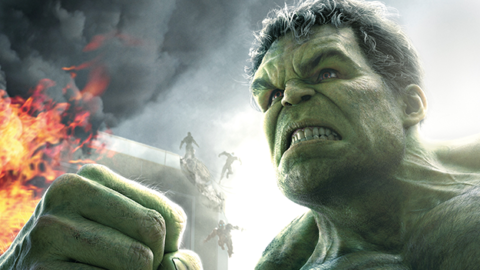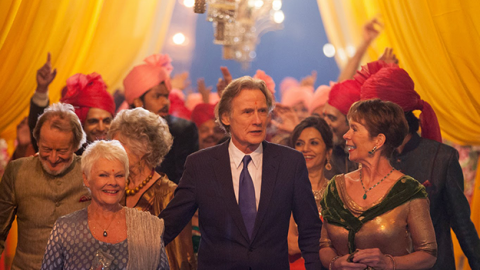Foundas on Film: The Avengers and Best Exotic Marigold Hotel

A superhero movie for the Super PAC era, the Marvel Comics all-star revue, The Avengers, reminds us that there’s still strength in numbers, at least where the fortunes of the Walt Disney Company (which is distributing the film as part of a long-term deal with Marvel) are concerned. Even before opening in the U.S., The Avengers has already racked up an impressive $300 million—or roughly $30 million more than the beleaguered John Carter earned in its entire release—and far be it from me to begrudge this superhero smorgasbord its success. It also arrives on a tide of enormous fanboy expectation and enthusiasm, and the early reviews have suggested that the fans are indeed pleased. But is that the sound of genuine excitement or merely relief?
Co-written and directed by Joss Whedon, the wunderkind behind TV’s Buffy: The Vampire Slayer and Firefly, The Avengers is a slickly entertaining package that manages to keep a lot of balls in the air—mini-sequels to Iron Man, Thor, and Captain America, plus yet another reboot of The Incredible Hulk—with agility (if not exactly flair), occasional flashes of wit, and a modicum of charm. After two-and-a-half hours of world-threatening chaos and world-saving derring-do, you leave the theater satisfied, but without so much as a single memorable image (or idea) lingering in your mind. As Hulk-sized “tentpole” movies go—those that have all of Hollywood’s resources at their disposal and the fates of entire studios in their hands—you could certainly do worse.
Maybe I’m just being overly nostalgic for the bygone days of summer movies past. Like the summers of 2008 and 2011, when the first Iron Man and Captain America pictures surprised with their genuine comic-book panache and—dare I say—lyricism. Though more modestly scaled than The Avengers, both were supremely enjoyable pop entertainments featuring a lot of old-fashioned movie craftsmanship (bold primary colors; action delineated into crisp, clean widescreen panels) courtesy of directors Jon Favreau and Joe Johnston—and, moreover, characters you could actually care about. The Marvel universe has always been rich in superheroes who remain decidedly flawed, vulnerable humans beneath the fancy get-ups and genetically enhanced musculature, and those movies managed to translate them to the screen along with a lot of high-tech wizardry and lo-fi genre love. You didn’t have to be a comics fan per se to share in Tony Stark’s euphoria (and faint terror) as he tried to get the hang of his rocket-powered super suit for the first time, or to mourn with Steve Rogers over the death of his best friend.

In The Avengers, the characters are the same, as are the actors playing them, but you don’t care about them as much because the movie itself doesn’t. It doesn’t reveal new layers to the characters or deepen our understanding of them in the way of sequels like The Empire Strikes Back, Superman II, and The Dark Knight. This time, it’s mostly all business. The tesseract—that all-powerful glowing cube last seen nearly winning WWII for the Nazis in Captain America—has resurfaced in present-day New York, where none other than Loki (the nefarious “frost giant” last seen falling into an interstellar abyss at the end of last summer’s execrable Thor) hopes to harness its energy to amass a drone army and open a portal between our world and his. Meanwhile, that suave superhero headhunter Nick Fury (Samuel L. Jackson) sets about rounding up his elite troops and briefing them on their mission.
Of the lot, only The Hulk/Bruce Banner (Mark Ruffalo) needs any real convincing, and it’s Ruffalo—stepping into the shoes vacated most recently by Edward Norton—who gives the The Avengers what personality it has. Perhaps because he’s new to the role, Ruffalo is the only actor in the film who’s allowed any significant scenes that don’t serve simply to keep the plot chugging along, and he makes the most of them to create an endearingly awkward Banner who seems perpetually uncomfortable in his own skin, whether white or green. The rest of the movie cries out for some quiet, character-building moments—or at least more crazy cameos on par with the great Polish auteur Jerzy Skolimowski as a Russian heavy who meets up with the wrong side of Scarlett Johansson’s Black Widow. What, for example, does Captain America, who has recently awoken from a decades-long slumber, make of this whole big, crazy, mixed-up modern world?
Television has always been hailed as a writer’s medium, driven by storytelling as opposed to visual grandeur, with the director on hand mainly to execute the writer’s wishes, never deviating too much from the established style of a successful series. Even in recent years, as television screens—and budgets—have grown larger, the writer has generally remained the master of this domain. And as audiences have found these series more consistently intelligent and entertaining than most of the movie studios’ commercial product, it’s no surprise that their creators—J.J. Abrams, Judd Apatow, Whedon—have been courted to write and direct movies. (Next up: David Chase.) This may ultimately prove to be a good thing, but for now it is bringing us a lot of movies that look and feel like big-screen television. (It was only with his third feature, last summer’s Super 8, that Abrams finally seemed fully in command of the new medium.)

The Avengers is rife with scenes that can be deemed “spectacular”—not least the climactic superhero rumble on the streets of Midtown Manhattan, during which that aforementioned portal in the sky opens up and unleashes enormous winged serpents that look like the love children of the alien from Alien and the spaceship from Alien. Hell appears to have quite literally broken loose, and yet for all his technical skill as a director (or at least his skill in surrounding himself with top-tier artisans) Whedon never really thinks in terms of images—the visuals are secondary to the story, and since the story itself is subpar, you notice this all the more. The Avengers has the polished, professional, but completely flat, anonymous look of a mid-Eighties James Bond picture. Throughout, I couldn’t stop wondering what an inspired creative force like Brad Bird might have done with this material. Then I remembered that he’d already done it: it’s called The Incredibles.
In one of those stranger-than-fiction tales from the Hollywood front lines, the legendary Indian director Satyajit Ray once wrote a script for Columbia Pictures entitled The Alien, about a gentle extraterrestrial who strikes up a friendship with a young boy in a rural Bengali village after his spaceship crashes there. Although the film was never produced, Ray himself saw more than a few lipstick traces of his scenario in Steven Spielberg’s E.T.: The Extra-Terrestrial (a movie that began life as a Columbia production), though he declined to press any formal charges.

There are no aliens in The Best Exotic Marigold Hotel, only Indians, but judging from the reaction of a cadre of British pensioners newly arrived in Jaipur, there isn’t much difference. An Avengers for the Cocoon generation, this postcolonial, culture-clash burlesque stars Maggie Smith, Judi Dench, and assorted other acting treasures of the Realm as the latest tenants of the titular B&B, a family-run resort whose reality turns out to be considerably less than the sum of its carefully photoshopped parts. They include Dame Judi as a widow forced to sell her London apartment to pay off her husband’s debts, a couple (Bill Nighy and Penelope Wilton) whose daughter invested their retirement nest egg in an Internet start-up that never started up, an old playboy (Ronald Pickup) looking for one more fling, and a retired High Court judge (Tom Wilkinson) searching for the India he knew as a young man.
“Can there be anywhere else in the world that is such an assault on the senses?” Dench asks in one of her character’s narrated diary entries. Well, definitely not in the eyes of screenwriter Ol Parker (adapting Deborah Moggach’s novel These Foolish Things) and director John Madden (Shakespeare in Love). Their India is a nonstop barrage of blaring sitar music, screeching horns, chattering street urchins, blinding sunlight, and enveloping dust—to say nothing of the obligatory spotty plumbing and electricity, and stomach-churning cuisine. At the center of it all is none other than the Slumdog Millionaire himself, Dev Patel, shucking and jiving his way through a truly embarrassing performance as the hotel’s harried, quixotic proprietor (who comes complete with a domineering mother and an unwanted arranged marriage). By the time the resident racist spinster (Smith) makes friends with an untouchable servant girl, I felt certain that the esteemed Mr. Ray was spinning in his grave.
Like a lot of movies that pitch themselves to supposedly “underserved” audiences—blacks, women, the elderly—The Best Exotic Marigold Hotel traffics in the very hoary stereotypes it ostensibly sets out to debunk. It’s a movie about finding purpose in life, late in life, that makes its point by first subjecting its characters to the most reductive grumpy-old-men/women shenanigans. These characters aren’t just old—they’re defined by their age, imprisoned by it, seemingly unable to talk or think about anything else. And yet the actors on screen are themselves vibrant evidence that life doesn’t end at 60, 70, or even 80. They—and India—deserve better.





